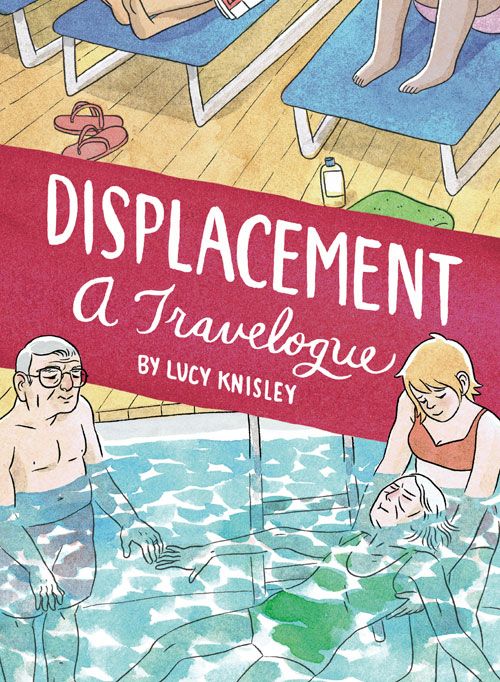In her latest travelogue, Lucy Knisley about-faces from the sex and adventure of "An Age of License" to look at mortality, responsibility and family. "Displacement" finds her accompanying her grandparents on their "last vacation" aboard a cruise ship, where she deals with their Alzheimers, physical limitations and fears while also confronting her own anxieties and relationships. Characteristically, Knisley's reflections run the gamut from giggly to weighty, and she's insightful about everything from her inevitable small selfishness to the emotional repression of her family members. "Displacement" is a lovely snapshot of the relationship between generations.
Knisley divides the book into days, ending each section with an excerpt from her grandfather's WWII diaries. She lets the entries lie without much editorializing, and the contrast does all the work of breaking the reader's heart. There's such a sharp difference between her grandfather's present condition, wetting himself and being outwitted by the simple logistics of an airport, and the lucid, free-ranging thoughts of his youth. Knisley demonstrates the great unfairness of aging: the old self can feel like a completely different person from the younger. In getting to know her grandfather through his journals, she also gets to know what she's missing out on.
The focus on Knisley's grandparents generally elevates the book. Travelogues run the risk of becoming merely monologues in a nice setting, a navel-gazing exercise of narrative privilege, but Knisley steps outside of herself so frequently here. Her grandparents' comfort is paramount and, while she takes plenty of pauses to analyze her own behavior, the focus is on navigating the nuances of care-giving. Whether it's delicately suggesting to do the laundry or hiding the luggage so her grandmother can't repack, Knisley tries to lighten the load of aging's infinite small humiliations without her grandparents' notice.
In another artist's hands, those efforts could come off as self-inflating martyrdom, but Knisley is funny and self-aware throughout. She questions her motives and overthinks logistics; even when it's her grandparents who've done something embarrassing, she's always the one who's most uncomfortable.
Knisley's cartooning style is also a wonderful asset to the book. "Displacement" condenses the most complex emotions and relationships into poignant, funny moments, demonstrating how those interactions encapsulate lifetimes of love, tension and unanswered questions. The sheer simplicity and expressiveness of her art is essential to that project. The rounded, warm figures are vulnerable and loveable in their cartoony-ness. Her squat, square grandfather and drooping grandmother look ready to teeter over at any moment, while Knisley herself is frazzled and surprised. The soft watercolors capture the sleepy, relaxed feel of ninety-somethings on a cruise ship, making Knisley's anxieties over which show to see or what to eat seem like funny overreaction. Knisley also blankets the book in white space, emphasizing the straightforwardness of her artwork and often making her and her grandparents seem like they're in their own little world.
I'll admit that, as a 20-something woman, I'm in the empathetic demographic for this kind of work, but "Displacement" is a beautiful little book. It's a step forward for Knisley as a writer and a cartoonist, and it's a wonderful experience for the reader.

